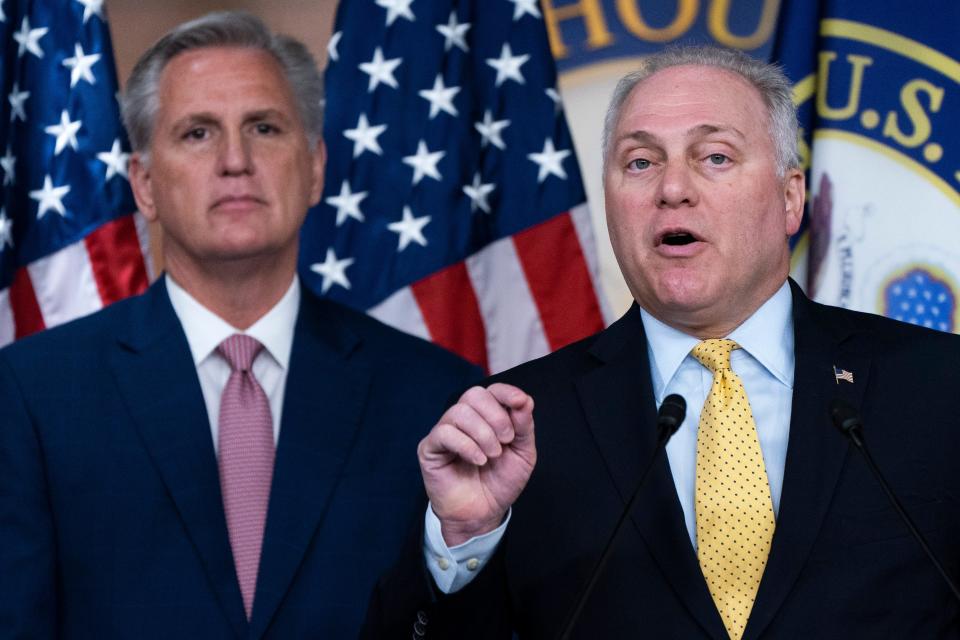Hang-ups on bipartisan gun deal remain. Can Congress pass legislation by July 4 recess?
- Oops!Something went wrong.Please try again later.
- Oops!Something went wrong.Please try again later.
- Oops!Something went wrong.Please try again later.
WASHINGTON – The most sweeping gun safety legislation in 30 years has a viable path from the Senate to the president's desk, but it's being challenged.
The hang-ups are likely to be ironed out, and it's not so much a question of if the measures will pass but when.
Senators are working to turn a bipartisan framework into legislative language lawmakers can debate. Supported by at least 10 Republicans, the gun control effort is likely to pass the upper chamber, though it's unclear whether senators can get the work done before the recess July 4, their self-imposed deadline.
Among other proposals, senators are considering:
Expanded background checks for 18- to 21-year-old buyers.
Closing the "boyfriend" loophole in domestic violence cases.
Grants for states to implement "red flag" laws.
Funding for school and community mental health resources.
Funding for school safety resources.
Criminalizing third-party straw purchases.
In the House, the legislation could hit some headwinds, but it is likely to pass.
"There are things about this I've got to see," Majority Whip James Clyburn, D-S.C., said Monday during an interview with USA TODAY.
He's glad the Senate is taking this "good step," but he's reticent to talk about the Senate framework until he sees the legislative language – and he said he's not alone.
The issues

Part of the Senate framework would increase background checks on buyers 18 to 21 years old by including juvenile records.
That would have stopped the mass shootings last month in Buffalo, New York, and Uvalde, Texas, Clyburn said.
Specifics and implementation are integral to the success of safeguards, Clyburn said.
He wants to see legislative language that would close a loophole involving the three-day waiting period for background checks. After those three days, even if the check isn't complete, the gun may be sold.
"Nine souls were killed in Charleston," partially because of that loophole, Clyburn said, referring to an attack in 2015 when a white supremacist gunman fired on Black worshippers at a church in South Carolina.
Clyburn has issues with grants to states that implement "red flag" laws, which allow courts to remove firearms from those deemed a threat to themselves or others.
He said such laws should be nationwide.
"A red flag law in South Carolina shouldn't be different from a red flag law in Georgia," Clyburn said. "We should unify the country with our legislative actions."
Letting states decide on their own "red flag" laws "tears at the fabric of our country," he said.
Though Clyburn said he and other Democrats have reservations, he expects reform will pass the House – with some Republican support.
Gun control deal: Group of senators – including 10 Republicans – announce breakthrough
'I don't feel safe at school': 11-year-old Uvalde survivor fears more shootings; other gun hearing takeaways
GOP support for the Senate gun deal
Republicans largely negotiated the Senate gun deal from the perspective of Sen. John Cornyn of Texas who said he wanted to save lives while preserving Second Amendment rights.
"I worked closely with my colleagues to find an agreement to protect our communities from violence while also protecting law-abiding Texans' right to bear arms," he said Sunday when he and 19 other senators announced the framework.
The 10 Republicans who have expressed support for the bipartisan deal, which would give Democrats the 60 votes needed to survive a filibuster are: Cornyn; Mitt Romney of Utah; Pat Toomey of Pennsylvania; Thom Tillis of North Carolina; Roy Blunt of Missouri; Richard Burr of North Carolina; Bill Cassidy of Louisiana; Susan Collins of Maine; Lindsey Graham of South Carolina; Rob Portman of Ohio.
Only one of them – Romney – faces reelection this year.
"Families deserve to feel safe and secure in their communities," Romney said Sunday. "It deserves broad support."
Toomey, Blunt, Burr and Portman will retire at the end of this year.
The other five senators – Cornyn, Tillis, Cassidy, Graham and Collins – aren't up for reelection until 2026.
Sen. Lisa Murkowski, R-Alaska, has not signed onto the bipartisan Senate deal. The moderate, who has voted with Democrats, is up for reelection this year.
Senate leaders said they aim to vote on the bipartisan legislation before the recess July 4.
House leaders differ on gun bills
Minority Whip Steve Scalise, R-La., was shot during a congressional baseball game June 14, 2017.
His office did not immediately respond to questions from USA TODAY about whether he or other Republicans would support the Senate gun deal.
Scalise has objected to measures pushed by his colleagues across the aisle.
As Democrats led a hearing last week to address gun violence, Scalise offered a rebuttal at a news conference where he compared the response to mass shootings with the aftermath of 9/11.
“Airplanes were used that day as the weapon to kill thousands of people and to inflict terror on our country,” Scalise said. “There wasn’t a conversation about banning airplanes.”
Instead, there was a conversation about “connecting the dots” and figuring out how to spot the signs to stop attacks, he said.
Airport and national security changed after 9/11. The Transportation Security Administration was added, the Department of Homeland Security was created, and air travel has been different throughout the nearly 21 years that followed.

House Minority Leader Kevin McCarthy, R-Calif., did not respond to USA TODAY's questions on the Senate package.
Even without Republican support, the House has enough of a Democratic majority to pass the deal.
Last week, the House passed the "Protecting Our Kids Act," a package of six gun safety bills, by a 223-204 vote. The legislation would raise the minimum age for purchasing semi-automatic rifles from 18 to 21, ban high-capacity ammunition magazines, expand background checks and require safe storage for firearms.
Only five Republicans voted for the act: Reps. Brian Fitzpatrick of Pennsylvania, Anthony Gonzalez of Ohio, Chris Jacobs of New York, Adam Kinzinger of Illinois and Fred Upton of Michigan. Fitzpatrick, who represents suburban counties around Philadelphia, is the only one on the ballot this fall.
Graham, one of 10 GOP senators to negotiate the bipartisan gun deal, said the House package is "an extreme constitutional overreach" that represents "the wish list of the left."
"I will vigorously oppose this measure," he said. "It will go nowhere in the Senate."
Democratic leaders said more work needs to be done on the Senate deal.
"While more is needed, this package will take steps to save lives," House Speaker Nancy Pelosi said in a statement Sunday.
Beyond the Senate package, House Democrats will fight for nationwide background checks, banning high-capacity magazines and raising the age to buy weapons, which Pelosi said "must also become law."
Majority Leader Steny Hoyer, D-Md., echoed Pelosi that more action is needed but said in a statement Sunday, "The Senate framework announced today will save lives and help build a safer America for our nation's children."
'We're angry': Thousands to rally against gun violence Saturday in March for Our Lives protests
Candy Woodall is a Congress reporter for USA TODAY. She can be reached at cwoodall@usatoday.com or on Twitter at @candynotcandace.
This article originally appeared on USA TODAY: Senate gun deal: Will it pass Congress with GOP support by July 4?

